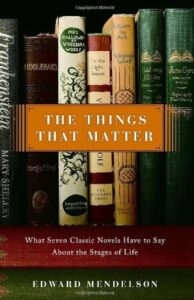
I was thrilled to discover a book by a noteworthy author which utilizes an organizing principle very similar to the “Life Stages” organizing principle I use in my book Movies That Will Change Your Life.
The book that I discovered is The Things That Matter: What Seven Classic Novels Have to Say About the Stages of Life by Edward Mendelson. I had no idea this book even existed when I was writing my book Movies That Will Change Your Life.
Edward Mendelson is a professor of English and comparative literature at Columbia University. He is the literary executor of W. H. Auden’s estate and the editor of Auden’s complete works. Among his previous books are Early Auden, Later Auden, and editions of novels by Anthony Trollope, George Meredith, Thomas Hardy, and Arnold Bennett.
I couldn’t help but notice that Mr. Mendelson and I are both partial to the novels of Thomas Hardy and Arnold Bennett. Arnold Bennett’s The Old Wives’ Tale is one of my favorite novels of all time! I was delighted that Mendelson’s book The Things That Matter focuses on the novels of Virginia Woolf. Virginia Woolf has long been one of my favorite authors.
I enjoyed reading Mendelson’s book and comparing our slightly different approaches to the “Stages of Life.” Here are the “Stages of Life” Mendelson uses to organize his book along with the titles of the novels he discusses:
1 Birth: Frankenstein
2 Childhood: Wuthering Heights
3 Growth: Jane Eyre
4 Marriage: Middlemarch
5 Love: Mrs. Dalloway
6 Parenthood: To the Lighthouse
7 The Future: Between the Acts
Here are the somewhat different “Stages of Life” I used to organize my book Movies That Will Change Your Life along with the titles of certain key movies I discuss:
1 Family: Tokyo Story
2 Childhood: The 400 Blows
3 Coming of Age: Frances Ha
4 Romance: In The Mood for Love
5 Sex: Y tu mama tambien
6 Relationships: Summer With Monika
7 Love: La Strada
8 Old Age: Dersu Uzala
9 Memory: Hiroshima mon amour
10 Death: Ikiru
I particularly enjoyed reading the following passage from Mendelson’s Introduction to The Things That Matter:
This book is about life as it is interpreted by books. Each of the chapters has a double subject: on the one hand, an English novel written in the nineteenth or twentieth century, and on the other, one of the great experiences or stages that occur, or can occur, in more or less everyone’s life…Anyone, I think, who reads a novel for pleasure or instruction takes an interest both in the closed fictional world of that novel and in the ways the book provides models or examples of the kinds of life that a reader might or might not choose to live. Most novels of the past two centuries that are still worth reading were written to respond to both these interests. They were not written to be read objectively or dispassionately, as if by some nonhuman intelligence, and they can be understood most fully if they are interpreted and understood from a personal point of view, not only from historical, thematic, or analytical perspectives. A reader who identifies with the characters in a novel is not reacting in a naive way that ought to be outgrown or transcended, but is performing one of the central acts of literary understanding.
I couldn’t agree more! The Things That Matter is a work of both learned scholarship and deep feeling. In his extraordinarily humane book, Mendelson seeks to repair what academic criticism has done its best to sever—the connection between literature and life.
I recommend reading each novel (including Frankenstein, Wuthering Heights, Jane Eyre, and Middlemarch) before turning to the relevant chapter in Mendelson’s book. In the case of Virginia Woolf’s very challenging novels, however, I found it very helpful to read the relevant chapter in Mendelson’s book both before and after reading the novels.
I enjoyed reading Jane Eyre so much that I decided to take a deep dive into the life and work of Charlotte Bronte. I purchased the ebook Delphi Complete Works of the Bronte Sisters on Amazon for $2.95. Then, I read the following books in the order indicated:
The Life of Charlotte Bronte by Elizabeth Gaskell
Charlotte Bronte by T. Wemyss Reid
Villette by Charlotte Bronte
Shirley by Charlotte Bronte
The Professor by Charlotte Bronte
As much as I enjoyed reading Charlotte Bronte’s novels, the highlight of my reading project was George Eliot’s Middlemarch. In The Things That Matter, Professor Mendelson describes Middlemarch as the greatest novel written in English. I wholeheartedly agree! Middlemarch is not only philosophically profound it is also unbelievably entertaining!